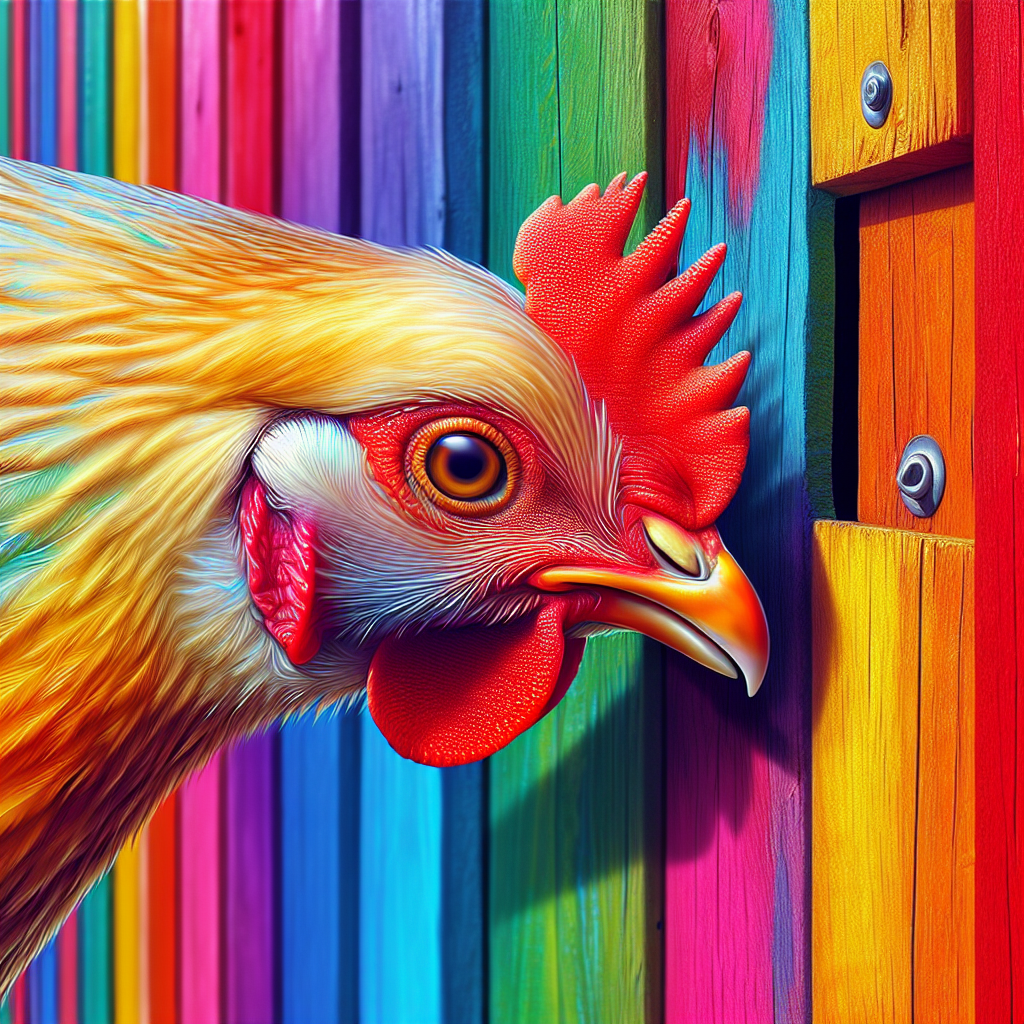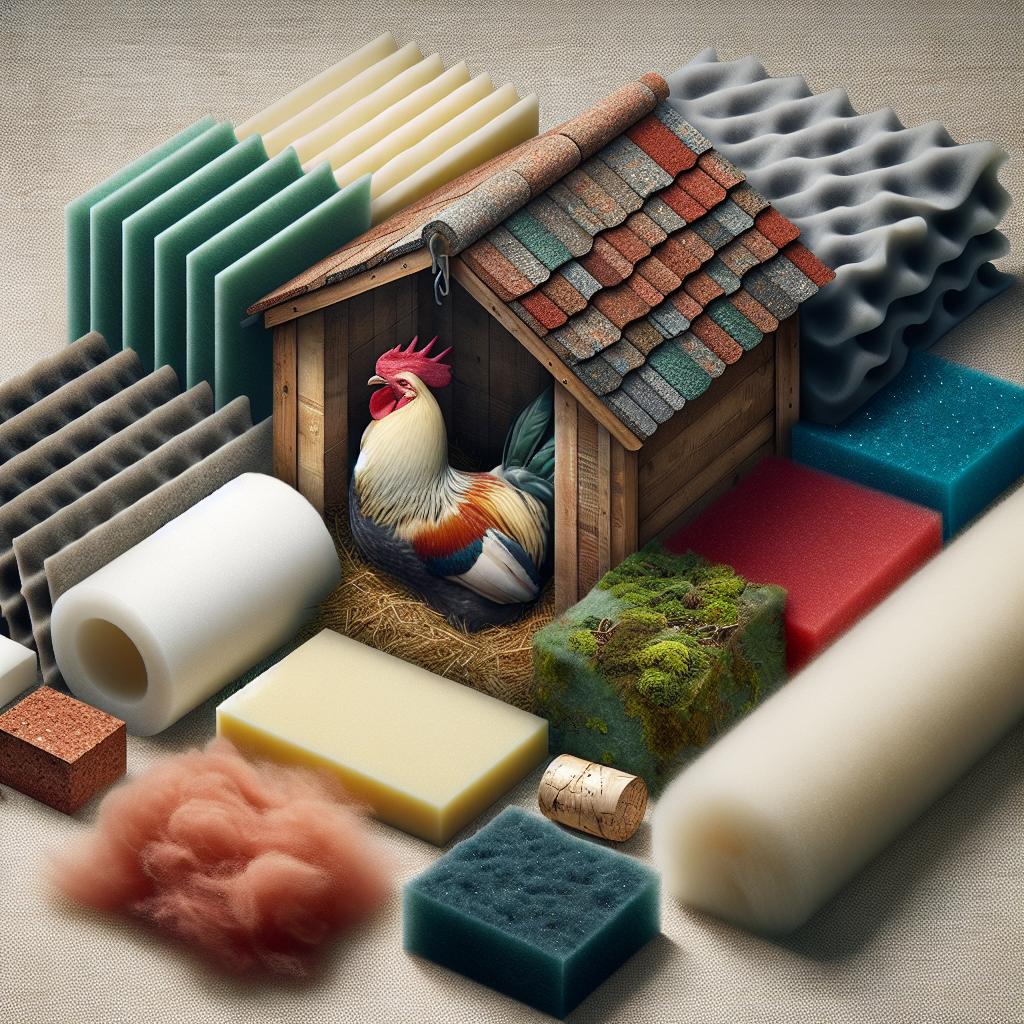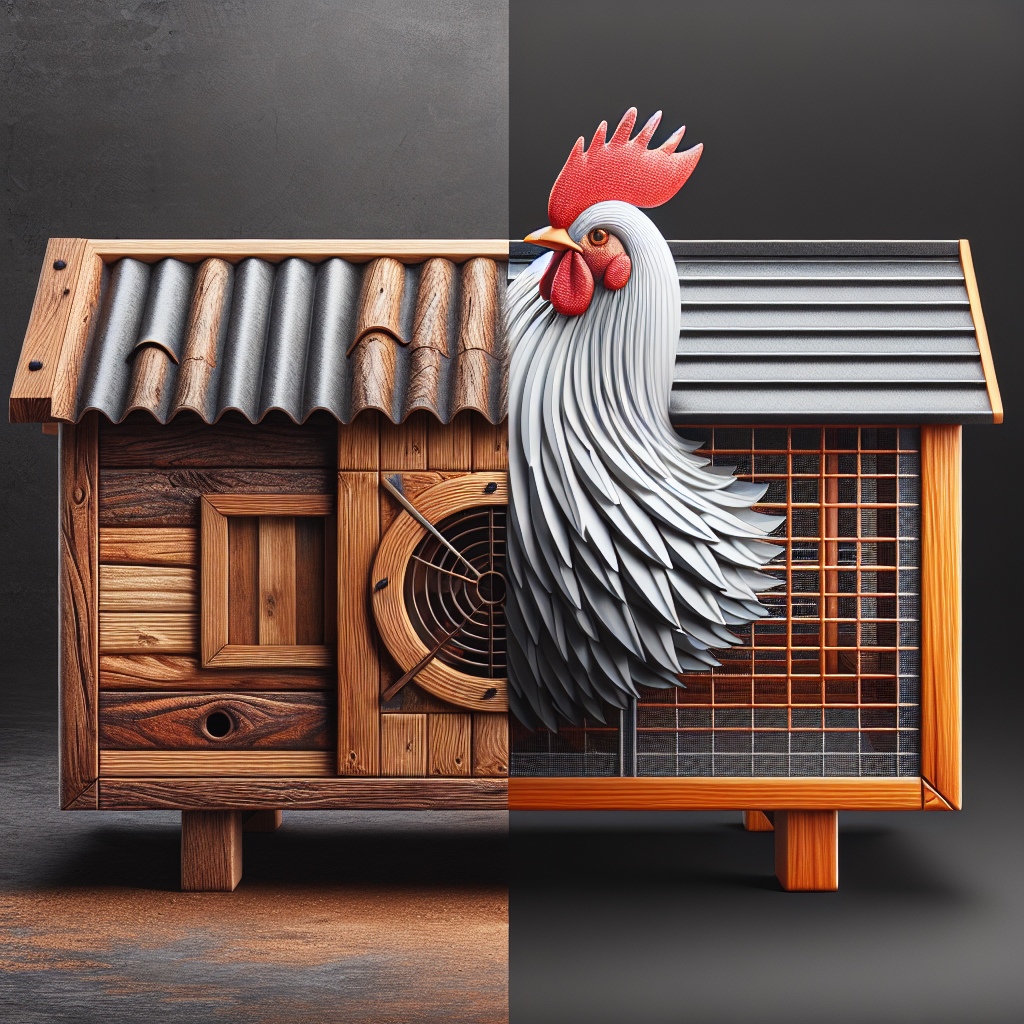In this article, you will explore the question of whether there are any materials that should be avoided when it comes to the health of chickens. As chicken owners, it is crucial to prioritize the well-being of our feathered friends. Therefore, understanding potential health risks associated with certain materials is essential. By the end of this article, you will have a better grasp of what materials to steer clear of, ensuring the safety and longevity of your beloved chickens.
Introduction
When it comes to keeping chickens, their health and well-being should be a top priority. As chicken owners, it’s essential to be aware of the potential health risks that certain materials can pose to our feathered friends. In this comprehensive article, we will explore various categories of materials and substances that should be avoided to ensure the safety and longevity of your flock.
1. Chemicals and Toxic Substances
1.1. Pesticides
Pesticides are commonly used to control pests in gardens and agricultural settings. However, it’s crucial to avoid exposing chickens to these chemicals. Pesticides, such as insecticides and rodenticides, contain toxic ingredients that can harm chickens if ingested. Choosing natural pest control methods and keeping chickens away from treated areas can help prevent any potential health risks.
1.2. Herbicides
Herbicides are chemicals used to kill unwanted plants and weeds. While they may be effective for managing vegetation, they should never be used near chicken coops or in areas where chickens have access. Chickens may accidentally consume herbicides while foraging, resulting in poisoning. Opting for organic weed control methods can ensure the safety of your flock.
1.3. Fertilizers
Fertilizers are commonly used to promote plant growth and improve soil fertility. However, certain types of fertilizers can be toxic to chickens if ingested. Chemical fertilizers, especially those containing high levels of nitrogen, can be harmful if chickens consume them directly or through contaminated soil. Using organic fertilizers or compost instead of chemical-based products is a safer option.
1.4. Cleaning Products
When it comes to cleaning chicken coops and equipment, it’s important to be cautious about the cleaning products you use. Harsh chemicals and toxic ingredients found in conventional cleaning products can be harmful to chickens. Opt for natural and non-toxic alternatives like vinegar, baking soda, or mild dish soap to clean your chicken coop and ensure your flock’s safety.
2. Construction Materials
2.1. Pressure-Treated Wood
Pressure-treated wood is commonly used for outdoor construction projects, including building chicken coops. However, it contains chemicals, such as arsenic and copper, which can be harmful if chickens come into contact with or ingest the wood. Avoid using pressure-treated wood in areas where chickens can peck or chew on it. Instead, opt for untreated or naturally rot-resistant woods.
2.2. Lead-based Paint
Lead-based paint is a significant health hazard for any living creature, including chickens. It can be found in old barns, sheds, and even on chicken coop surfaces. If ingested, lead can lead to lead poisoning in chickens, causing serious health issues. Ensure that any surfaces the chickens may come into contact with are free from lead-based paint by repainting with non-toxic alternatives.
2.3. Asbestos
Asbestos is a highly toxic material that was commonly used in older construction materials. It can still be found in some older chicken coop structures. Inhalation of asbestos fibers can lead to severe respiratory issues and potentially cancer. If you suspect the presence of asbestos in your coop, it’s crucial to seek professional help for its removal and ensure the safety of your flock.
2.4. PVC Pipes
PVC pipes are commonly used for plumbing and irrigation systems. While they are convenient for humans, chickens can easily peck at them or damage them. Ingesting small particles of PVC can cause blockages in their digestive system. It’s best to use alternative materials like galvanized steel or flexible piping for water and irrigation systems in chicken coops.
3. Bedding and Nesting Materials
3.1. Cedar Shavings
While cedar shavings may be commonly used as bedding material, they can be harmful to chickens if used in excess or if chickens ingest them. Cedar contains aromatic oils that can irritate chickens’ respiratory systems and potentially cause liver damage. Opt for alternative bedding options such as pine shavings, straw, or shredded paper for your chicken coop.
3.2. Pine Shavings
Pine shavings are a popular choice for chicken coop bedding due to their affordability and availability. However, high levels of phenols found in freshly cut pine can be toxic to chickens. To avoid any potential health risks, make sure the pine shavings are properly dried and aged before using them as bedding material for your flock.
3.3. Corncobs
Corncobs might seem like a natural and harmless option for chicken nesting material, but they can pose a choking hazard to chickens. The hard and dense texture of corncobs can cause digestive blockages if ingested. Instead, consider using soft nesting materials like straw, hay, or shredded paper, which are safer and more suitable for chickens.
3.4. Straw
Straw is a common choice for chicken coop bedding and nesting material. While it can provide warmth and comfort, it’s important to ensure the straw is fresh, clean, and free from molds or fungi. Moldy straw can contain toxins that can cause respiratory issues and other health problems in chickens. Regularly replace and inspect the straw to maintain a healthy environment for your flock.
4. Feed and Supplements
4.1. Moldy or Spoiled Feed
Feeding your chickens moldy or spoiled food can lead to serious health issues. Mold can produce toxins that can cause digestive disorders, liver damage, and even death in chickens. Always check your feed for any signs of mold or spoilage before providing it to your flock. Proper storage and rotation of feed can help prevent any potential health risks.
4.2. Medicated Feed
Medicated feed is commonly used to prevent diseases and promote growth in chickens. However, it’s crucial to follow the recommended dosage and withdrawal periods to prevent any potential harm. Using medicated feed for extended periods or exceeding the recommended dosage can lead to antibiotic resistance in chickens and may have adverse effects on their health.
4.3. High Sodium or Salt Content
While chickens do require some sodium in their diet, excessive sodium or salt intake can be harmful. High sodium levels can lead to dehydration, kidney issues, and even death in chickens. Always provide a balanced and appropriate diet for your flock, ensuring that their sodium intake remains within healthy limits.
5. Plants and Vegetation
5.1. Poisonous Plants
Chickens are natural foragers, and they will often peck at plants and vegetation. However, some plants can be toxic to chickens if ingested. Plants such as nightshade, oleander, and rhubarb leaves contain toxins that can cause illness or even be fatal if consumed by chickens. Educate yourself on the types of poisonous plants and remove them from areas accessible to your flock.
5.2. Toxic Garden Waste
While composting garden waste is a sustainable practice, it’s crucial to avoid adding toxic or pesticide-treated plant material to your compost pile. These toxins can easily transfer to the compost, making it harmful if ingested by chickens. Prioritize composting organic and pesticide-free plant waste for a healthy and safe composting system.
5.3. Avocado
Avocado is toxic to many animals, including chickens. The fruit, pit, leaves, and bark of the avocado tree contain a substance called persin, which can cause heart and respiratory issues in chickens. Avoid feeding avocados or allowing chickens access to avocado trees to prevent any potential health risks.
6. Containers and Packaging
6.1. Plastic Containers
Plastic containers and packaging materials can be a hazard to chickens if ingested or if they peck at them. Plastic can cause intestinal blockages or choking. When storing food or water for your flock, opt for metallic or glass containers that are safe for chickens and reduce the risk of accidental ingestion.
6.2. Styrofoam
Styrofoam products, such as food containers and packaging, should not be used for chickens. Not only can they cause digestive blockages if ingested, but they also pose a choking hazard. Seek alternatives like environmentally friendly paper or cardboard containers for feeding and watering your flock.
6.3. Metal Packaging
While metal packaging may seem safe at first glance, sharp edges or exposed metal can pose a risk. Chickens may accidentally injure themselves on sharp edges or consume small metal fragments, leading to internal injuries. Inspect all metal packaging thoroughly before using it around your flock and ensure it is secure and free from any sharp or dangerous parts.
6.4. Glass Packaging
While glass packaging can be safer than plastic or metal alternatives, it should still be used with caution around chickens. Broken glass can cause severe injuries, including cuts and puncture wounds. Avoid using glass containers or packaging in areas accessible to chickens to minimize any potential risks.
7. Medications and Treatments
7.1. Antibiotics
While antibiotics are essential for treating bacterial infections, excessive or unnecessary use of antibiotics can lead to antibiotic resistance in chickens. It’s important to follow veterinary guidance and only administer antibiotics when necessary. Avoid self-medicating your flock and consult a veterinarian for proper diagnosis and treatment.
7.2. Dewormers
Deworming medication is commonly used to control internal parasites in chickens. However, improper use or excessive dosage can be harmful. Always follow the recommended dosage and withdrawal periods to ensure the health and safety of your flock. Consult a veterinarian for guidance on proper deworming protocols.
7.3. Insecticides
Insecticides are commonly used to control external parasites such as mites and lice in chicken coops. However, it’s crucial to choose approved and safe insecticides specifically formulated for poultry use. Avoid using products intended for other animals or crops, as they can contain ingredients that are toxic to chickens. Follow the instructions carefully and ensure proper ventilation when applying any insecticides in the chicken coop.
8. Miscellaneous Items
8.1. Cigarette Butts
Cigarette butts may seem harmless, but they can be toxic to chickens if ingested. Cigarette filters contain harmful chemicals, including nicotine, that can lead to nicotine poisoning in chickens. Ensure that your chicken coop and surrounding areas are free from cigarette butts to protect your flock’s health.
8.2. Batteries
Batteries contain toxic materials, such as lead and acid, which can pose a severe health risk to chickens if chewed or ingested. Ensure that all batteries are stored in a secure location and dispose of them properly. Keep batteries out of reach from your flock to prevent accidental exposure.
8.3. Paint Chips
Peeling or chipped paint in chicken coops or structures can be a tempting pecking source for chickens. However, ingesting paint chips can be harmful and lead to lead poisoning. Regularly inspect and maintain the paint on coop surfaces to prevent any potential ingestion risks. Remove any peeling paint and apply non-toxic alternatives to keep your flock safe.
8.4. Sharp or Pointed Objects
Sharp or pointed objects in the chicken coop or run can lead to severe injuries if chickens come into contact with them. Remove any sharp objects such as nails, broken glass, or exposed wires that could potentially harm your flock. Regularly inspect the coop and run for any hazards and ensure a safe environment for your chickens.
9. Conclusion
Keeping chickens healthy and safe involves being mindful of the materials and substances they come into contact with. By avoiding chemicals and toxic substances, being cautious with construction materials, choosing suitable bedding and nesting materials, providing safe feed and supplements, being aware of poisonous plants, using appropriate containers and packaging, properly administering medications and treatments, and avoiding miscellaneous hazardous items, you can create a safe and nurturing environment for your feathered friends. Remember, a little prevention goes a long way in protecting the well-being of your beloved flock.




